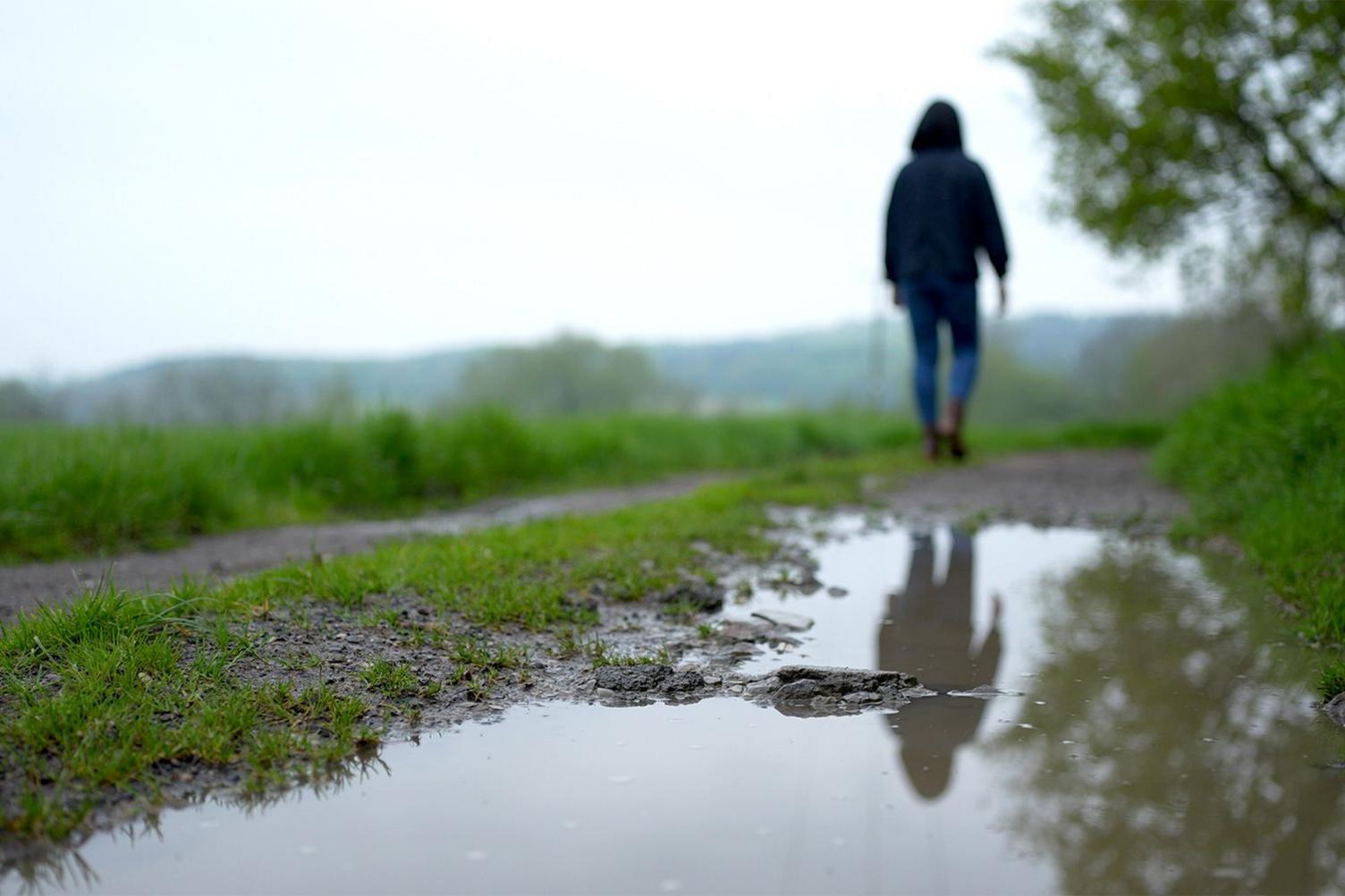'My rapist is now my stalker': Woman blames years of police errors

- Published
A woman who says she was raped in 2017 has described the criminal justice system as "absolutely broken" after a series of problems and errors allowed the accused man to allegedly start stalking her.
Despite reporting the rape allegation to police the day after it happened, the case is not due to be tried in court until next May - eight years after the alleged assault.
In that time, delays and errors by police, mistakes by prosecutors and court backlogs have contributed to the woman having a mental breakdown.
"It's shambolic, embarrassing, disgraceful and debilitating," says the woman, who is legally entitled to anonymity. "I shouldn't have felt abandoned and hopeless."
The woman, who we are calling Samantha, says the rape was carried out in March 2017 by a man who was "prevalent in my life before and knew where I lived".
After she reported it, the man was arrested and questioned before being released under investigation. Samantha says West Mercia Police initially updated her on developments but, after about six months, communication petered out and her efforts to make contact went unanswered.
"Being left like that - forgotten about - is exactly how you're made to feel."
Case dropped after two years
Out of the blue, in 2019, two officers came to Samantha's house. They handed her a letter - from the Crown Prosecution Service - saying it had decided not to proceed with the case because of a lack of evidence.
"It came as a complete surprise - I felt abandoned."
By that time, Samantha says, the man had started stalking her. She says he would follow her to her children's school, trail her on errands, or just appear at places she regularly visited - including her workplace.
She reported it to two police forces - West Mercia, where she lived, and Warwickshire, where she worked. Samantha was told to call the non-emergency number, 101, but gave up because of lack of support.
She was told "he hasn't done anything yet" or "he's only on the other side of the street", she says.

Samantha says the man would appear in places she visited regularly
Throughout this period, Samantha was receiving support from an Independent Sexual Violence Adviser, a role funded by the Ministry of Justice that supports complainants of sexual abuse.
She greatly credits her adviser with helping her to cope, both with the emotions of the case as well as chasing the police to take her allegations seriously.
However, three months after the CPS said the case would not be prosecuted, the adviser was withdrawn, a standard procedure. Feeling stressed and alone, Samantha had a mental breakdown.
"For many months, I was in and out of the GP surgery asking for help, because I found it very difficult to cope with day-to-day life. I was trying to work and be a mum to my kids, trying to just function."
Samantha says she could go weeks without seeing the man and then there would be "multiple sightings and appearances just to remind me that he was still around".
It all came to a head one morning when she could not get out of bed, she says.
"I consider myself a strong character but, on that day, I physically couldn't do anything. I was processing the fact that it was so definitive - no-one was going to help me."
Strangely, the pandemic made things easier. Samantha says the man stopped appearing, she was able to focus on her two children and keep her business going.
Case reopened
In 2022, an unexpected email arrived.
"May I take this opportunity to apologise on behalf of the CPS for any distress caused to you by the previous decision made not to prosecute this case," wrote Nicola Haywood, the Deputy Chief Crown Prosecutor.
As part of a national review of rape cases, prosecutors had reconsidered the evidence in Samantha's case and concluded they had made a mistake.
"Consequently, I have decided that a prosecution should now be brought… for offences of rape, assault by penetration, attempted rape and sexual assault."

Samantha says she is still regularly reporting stalking incidents to the police
Samantha's world was turned upside down.
"My mind went to how do I cope with that, having had a breakdown, [then] some element of recovery and not wanting to invite that back into my life."
Around this time, the man moved his business closer to Samantha. After several months considering her options, she decided she had no choice but to pursue the case.
But the problems kept coming. Delays and an inexplicable back-and-forth between the CPS and West Mercia Police meant it was almost a year before the man was charged and then released on bail.
His first court appearance was scheduled for September 2023, 20 months after Samantha had been told by the CPS it was going to charge him.
West Mercia Police told us it could not comment while court proceedings are active.

There are a record 2,786 adult rape cases waiting to go to court in England and Wales, part of a record 10,141 number of sexual offences awaiting a trial
In 2023, 68,022 rapes were recorded by police in England and Wales, fewer than 3% resulted in someone being charged that same year
In England and Wales in 2023, it took on average 777 days from a rape being reported to police to the case being completed in court. In West Mercia, it took 968 days
Source: Ministry of Justice, ONS, Home Office, UK Government

By the time the man had been charged, says Samantha, the stalking had restarted. On one occasion, officers from Warwickshire attended after he had been observing Samantha from a roadside food van. She says one of them dismissed her concerns: "I can't arrest him for having his lunch, love."
"I'll never, ever forget those words - I just felt like being crushed inside," she says.
At one point, the police told Samantha they were taking her repeated reports of stalking seriously and that the man's bail conditions would include a clause stipulating that if he was to go anywhere near her, he would risk arrest.
But an admin error meant West Mercia forgot to put the restrictions in place, and Samantha says the stalking continued.
She says she believes if the bail conditions had been administered correctly, the man would have been arrested.
She is still regularly reporting stalking incidents to the police - "I'm becoming their administrator for all the stalking that's taking place," she says, but adding there is "absolutely no action" being taken.
Warwickshire Police said it was investigating and "always aims to put measures in place to protect and support" victims of domestic abuse. "It is always concerning when a victim is not satisfied with the service they have received," added Detective Inspector Ruth Morris.
Courts in Crisis: The struggle for justice in one English town
- Published10 June 2024
Samantha's case was finally due to go to court in May 2024. But in February, a member of the police's witness care team rang Samantha to say it would have to be postponed.
She was told one of the contributing factors was the roof collapse at Hereford Crown Court in 2020. Cases that should have been heard there are now being spread around the West Mercia courts system.
Samantha's area has some of the longest court delays in England and her case isn't due to be heard until May 2025.
"I don't care that there's not enough courtrooms. I care what I'm going through. I care that I'm an example of thousands of people in a system that is absolutely shameful," she told us.
The Labour government has acknowledged the problem and announced plans to fast-track rape cases, with specialist courts in every Crown Court.
The Crown Prosecution Service told us it recognises the profound effect delays have on victims and says it is working with police to build strong cases and improve timeliness.
It says latest figures indicate the time between the CPS receiving evidence and making charging decisions is "coming down sharply".
"We are consistently charging around seven in 10 rape cases referred to us by police," it added. However, in 2023, only 2.1% of rape cases, external, resulted in the suspect being charged or summoned to court.
Unsurprisingly, there have been moments when Samantha has wished she had never reported the rape: "It doesn't encourage you to come forward."
But she has stuck with the case - and will go to court – because, she insists, "it's the right thing to do".
If you are affected by issues raised in this article help and support is available via the BBC Action Line.
Get in touch
Have you been affected by the issues raised in this story?